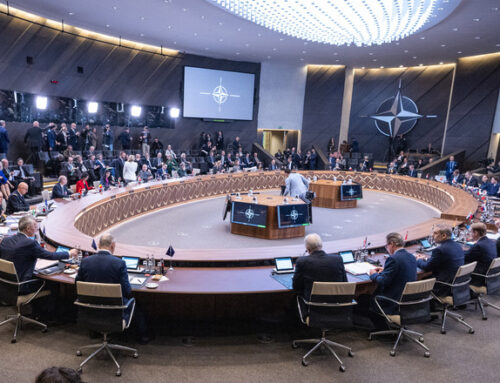Wheat Field-min
Autor foto: John Briody Photography

Grain Deal Terminated – Russian Blackmail and Averting a Humanitarian Crisis
18 lipca, 2023


Wheat Field-min
Autor foto: John Briody Photography
Grain Deal Terminated – Russian Blackmail and Averting a Humanitarian Crisis
Autor: Sebastian Czub
Opublikowano: 18 lipca, 2023
On Monday July 17, 2023, Kremlin spokesperson Dmitry Peskov announced that the Grain Deal had been terminated. This means that Ukrainian ships carrying grain and other food products will no longer be protected and could be targeted by the Russian armed forces. The grain deals began in 2022 as an effort to facilitate the transport of Ukrainian grain out of the war torn country to prevent famine in countries reliant on Ukrainian deliveries. This culminated in the United Nations Black Sea Grain Initiative, signed in Istanbul, which brokered an agreement between Ukraine and Russia on safe and unbothered transport of grain and other food products to countries affected by the war caused shortages.[i] The plan had been implemented by the mediation of UN and Turkish officials and experts, who along with their Ukrainian and Russian counterparts oversaw the transports. Now, as the Grain Deal has been terminated many countries and millions of people might face starvation and famine.
Russian Objectives
As the Grain Deal has been kept operational for the last year with very limited hindrance the Russian decision to withdraw is extremely curious. There can be several reasons standing behind this decision.
The first possibility is that this is the Russian punchback after Erdogan’s “betrayal”. Last week, the Turkish President committed two actions that are viewed negatively by Moscow. First of all Erdogan announced that Turkey will ratify Sweden’s ascension to the NATO alliance. Turkey has been blocking Sweden’s admission for the last year, only announcing their support last week during the NATO Summit in Vilnius. This decision also led to Hungary stating that they would no longer block Sweden’s ascension which means that very soon Sweden will follow in Finland’s footsteps and officially join the alliance. This announcement was obviously viewed quite badly by Moscow which has been campaigning to stop NATO from growing, and has most probably used relatively friendly relations with Turkey and Hungary to achieve that. Turkey’s decision thus comes as a “betrayal” for which the Russian might be punishing Turkey by breaking the Grain Deal which was brokered by the state. The Russians might also be punishing Turkey for the transfer of Azovstal defenders and Azov Brigade commanders from their custody back to Ukraine. Previously Turkey negotiated the release of mentioned personnel with Russia, promising to hold them in Turkey until the end of the war. Among the returned was Lieutenant Colonel Denys “ Redis” Prokopenko, who has announced his return to service and reassumed command of the Azov Brigade.[ii]
The Russians might also be aiming to use the Grain Deal termination to pressure the West into lessening support for Ukraine or other concessions – potentially withdrawing certain sanctions. The blockade of Ukrainian grain and food products could potentially lead to widespread famine in countries of northeastern Africa and Middle East, which rely on Ukrainian food exports.[iii] Similar events occurred in 2014, when the Russian annexation of Crimea and the conflict for the so-called “breakaway republics” hindered and halted Ukrainian transports. This has been since traced as a cause of civil unrest and the Arab Spring which destabilised large parts of the region, heavily influencing and negatively impacting Turkey and the EU as well. Should the West not offer concessions or broker a deal with Russia, the destabilisation of the situation in the Middle East and Northeastern Africa might force the West to shift some of their focus away from Ukraine to deal with a growing new crisis.
Response to the Russian Famine Blackmail
In response to the Russian termination of the Grain Deal the West has been hard at work to create solutions. One of the bargaining chips that has been considered by the EU is the reconnection of Russia to the SWIFT system.[iv] Russia has been cut off from the system following its invasion of Ukraine. The lack of access to SWIFT has heavily hindered Russian trade and banking operations, making it one of the most successful sanctions imposed by the West on the warmongering country. Should Russia manage to blackmail the West into regaining access, it would not only improve Russia’s economic situation, but also be seen as a sign of weakness of the West.
The US has also taken an active stance since the Russian announcement. US Secretary of State Antony Blinken stated that Russia is „weaponizing food” by denying food products to those who need it and making food prices worldwide rise.[v] U.K. Foreign Secretary James Cleverly expressed similar concerns, stating that “Putin is using food as a weapon” which will “hurt the world’s poorest”. Ukrainian Minister of Foreign Affairs has also arrived in New York to hold urgent consultations both with partners at the UN and US allies and support the search for solutions to the Grain Deal crisis. The US has since announced that it, along with Ukraine and allied countries, will seek alternative solutions, including alternative methods of transportation – most probably road and railway connections which were established in Ukraine’s neighbouring countries – mainly Poland. Such a solution was already used in the past when Russia temporarily suspended the operations of the Grain Deal.
Another solution would be to continue operating the Grain Deal without Russian agreement. Such a solution was hinted at by President Zelensky, who stated that the Grain Deal is an agreement between Ukraine, UN, and Turkey, not Ukraine and Russia.[vi] Zelensky has already sent messages to President Erdogan and UN Secretary General calling on the to maintain the Grain Deal, and proposed a coalition of countries that could protect Ukrainian grain ships.[vii] Such a temporary solution was temporarily implemented in Autumn 2022, when Russia temporarily withdrew from the agreement.
Conclusions
The potential consequences of the Russian withdrawal from the Grain Deal are monumental, with many countries being affected by potential food shortages, rising food prices, and even famine. The Russian ruthless threat of famine as a political tool to force concessions and loosen sanctions from the West might prove disastrous not only for the countries directly affected by food shortages but also the West, which will be forced either to face a new crisis or concede to Russian demands. That is unless the West manages to apply alternative solutions – of which many are already discussed.
Author: Sebastian Czub, analyst Casimir Pulaski Foundation
Supported by a grant from the Open Society Initiative for Europe within the Open Society Foundations
[i] “Beacon on the Black Sea”, United Nations Black Sea Grain Initiative
Joint Coordination Centre, accessed April 21, 2023, https://www.un.org/en/black-sea-grain-initiative.
[ii] “Azov Brigade commander meets with personnel, announces his return to service”, Ukrinform, July 16, 2023, https://www.ukrinform.net/rubric-ato/3736591-azov-brigade-commander-meets-with-personnel-announces-his-return-to-service.html.
[iii] Rob Picheta, Mick Krever and Anna Chernova, “Russia pulls out of Ukraine grain deal, in potential blow to global food supplies”, CNN, July 17, 2023, https://edition.cnn.com/2023/07/17/europe/russia-ukraine-grain-deal-intl/index.html.
[iv] Michelle Nichols, “UN asks Putin to extend Black Sea grain deal in return for SWIFT access, sources say”, https://www.reuters.com/markets/commodities/un-chief-sends-putin-proposal-keep-black-sea-grain-deal-alive-2023-07-12/.
[v] Elsa Court, “Blinken: Russia 'weaponizing food’; US to help Ukraine with exports after grain deal collapse”, The Kyiv Independent, July 17, 2023, https://kyivindependent.com/blinken-us-will-help-ukraine/.
[vi] Antoinette Radford, and Kathryn Armstrong, “Ukraine grain deal expires after Russia pulls out”, BBC, July 17, 2023, https://www.bbc.com/news/world-europe-66223280.
[vii] “Навіть без рф треба робити все, щоб «зерновий коридор» і далі діяв — Президент України”, ArmyInform, July 17, 2023,






